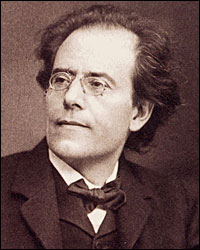Glory on the Home Stretch: Mahler's 8th at the Kennedy Center
 Some five-hundred-odd singers and instrumentalists under the baton of Leonard Slatkin filled the Kennedy Center’s Concert Hall Thursday evening; literally – but more importantly with the bombast, splendor, and ethereal sound of Mahler’s most perverse, most ambitious, most idiosyncratic “Symphony,” the eighth. This symphony, garishly divine (or is it divinely garish?) tends not to be the favorite among Mahlerians (Schmachtfetzen – weepy-rag – is a popular derision among the ‘cognoscenti’) but is likely to leave the deepest impression on listeners with less set tastes and ideas about Mahler. Especially in concert where sheer force goes a long way in impressing. (As far as I know, only Harvergal Brian’s “Gothic” among existing symphonies demands more personnel for performance.)
Some five-hundred-odd singers and instrumentalists under the baton of Leonard Slatkin filled the Kennedy Center’s Concert Hall Thursday evening; literally – but more importantly with the bombast, splendor, and ethereal sound of Mahler’s most perverse, most ambitious, most idiosyncratic “Symphony,” the eighth. This symphony, garishly divine (or is it divinely garish?) tends not to be the favorite among Mahlerians (Schmachtfetzen – weepy-rag – is a popular derision among the ‘cognoscenti’) but is likely to leave the deepest impression on listeners with less set tastes and ideas about Mahler. Especially in concert where sheer force goes a long way in impressing. (As far as I know, only Harvergal Brian’s “Gothic” among existing symphonies demands more personnel for performance.)
Sprawling all over the Concert Hall – the sides of the first tier were lined with chorus members and brass reinforcements – that’s exactly what the assembled forces did as a painstakingly rehearsed set of choirs (Cathedral Choral Society, J. Reilly-Lewis – Children’s Choir of Washington, Joan Gregoryk – The Choral Arts Society of Washington, Norman Scribner – The Master Chorale of Washington, Donald McCullough – The Washington Chorus, Robert Shafer) came together for combined and, more importantly, cohesive greatness.
Tim Page, A Shout-Out to Mahler's Eighth (Washington Post, June 9) Charles T. Downey, DCist Goes to the Symphony (DCist, June 9) Performance, December 12th 2005: Mahler 3rd, Conlon/Juilliard Orchestra Performance, May 10th 2005: Mahler 9th, Barenboim/CSO Performance, April 21st 2005: Mahler 9th, Slatkin/NSO Performance, April 12th 2005: Mahler 4th, Temirkanov/BltSO Performance, November 29th 2004: Mahler 5th, Eschenbach/Philadelphia Performance, November 10th 2004: Mahler 1st, R. Abbado/NSO Recording: Mahler 9th, MTT/SFSO Recording: Mahler 2nd, MTT/SFSO Recording: Mahler 6th, I. Fischer/BdPFSO Recording: Mahler 6th, Abbado/BPh et al. Recording: Mahler 8th, Rattle, Nagano, Kubelik, Järvi Recording: Mahler 3rd, Boulez/VPh |
 Mahler’s 8th, premiered on September 12th, 1910, under Mahler’s baton with 1,029 performers (858 singers, 171 orchestral members – impresario Emil Gutmann coined the “Symphony of a Thousand” moniker) is made up of two perfectly unconnected parts, a massive choral and organ section over orchestra set to the 1,200-year-old Latin hymnus Veni, creator spiritus and then the mysterious music set to the equally mysterious closing scene of Goethe’s Faust, Part II. The purported connection between the two texts is the third line of the third verse, Accende lumen sensibus – but whether that is enough to convince most listeners really depends more on their willingness to embrace Romantic mysticism than musical appreciation. The music is harmonically less daring than what came after it (Das Lied, the 9th and 10th symphonies) and even of some that came before – but more importantly it is of a completely different character. Devoid of the Angst-driven, caustic-Austrian nature that fills his symphonies to bursting with Lokalkolorit (local colors) and neuroticism, it is truly a symphony not of this world, far more universal in its style.
Mahler’s 8th, premiered on September 12th, 1910, under Mahler’s baton with 1,029 performers (858 singers, 171 orchestral members – impresario Emil Gutmann coined the “Symphony of a Thousand” moniker) is made up of two perfectly unconnected parts, a massive choral and organ section over orchestra set to the 1,200-year-old Latin hymnus Veni, creator spiritus and then the mysterious music set to the equally mysterious closing scene of Goethe’s Faust, Part II. The purported connection between the two texts is the third line of the third verse, Accende lumen sensibus – but whether that is enough to convince most listeners really depends more on their willingness to embrace Romantic mysticism than musical appreciation. The music is harmonically less daring than what came after it (Das Lied, the 9th and 10th symphonies) and even of some that came before – but more importantly it is of a completely different character. Devoid of the Angst-driven, caustic-Austrian nature that fills his symphonies to bursting with Lokalkolorit (local colors) and neuroticism, it is truly a symphony not of this world, far more universal in its style.Ironically, it’s gotten wrong in style more often than the other symphonies. There is a, perhaps Anglo-Saxon (although Haitink and Tennstedt are honorary members, whereas Maazel isn’t), way with this work that focuses on drive, élan, a swift progression, and a purposeful reading that may dazzle – but ultimately undermines the symphony by failing to bring across that extraordinary, indecisively wavering, hovering, shimmering last movement. Sir Georg Solti’s famed recording is the principal exponent of such glorious failure, Sir Simon Rattle’s a mere carbon copy of all that is wrong with it. (Ozawa for Philips, Bernstein and Abbado for DG, Mitropoulos on Orfeo, even Nagano for Harmonia Mundi seem to understand it better, do it justice.) Needless to say that I feared similar results – a “Mawler’s 8th” – from Leonard Slatkin (famously great at English and American music), a late-comer to Mahler himself. Alas…
The first movement, for sure, was strident, fast, powerful, driven. It can be given more room to breathe (Maazel takes it to the limits, for example - Järvi races through it like mad) in which case the male voices of the choir might have been less prone to slur, but Veni, creator spiritus is the bombast, the glory-onslaught on our senses and one continuous climax hell- (or heaven-) bent to impress, and it suffers less, sometimes not at all, from this approach. It is the second part that is the symphony’s heart and most difficult to get just right. Mahler described it as planets and suns singing, not human voices. It is disconnected from what we know, based on that most opaque Romantic outburst of poetry, the drug-hazed, eccentric, yonder-worldly Faust II of Goethe’s. Minor modifications of the text may be attributable to Mahler having originally put it to the music from memory. Faust II was at the time a staple literary work for all well-educated German speakers; only over the last 100-some years has it become more obscure as people lack the stamina, will, and understanding to challenge themselves with its misty spiritualism. Mere splendor does not work here, and force and ability are not enough to convey its evasive, prismatic, opaline, mist-hovering shapelessness.

The choral entry here was perhaps a little too punctuated, not as quiet as ideal, nor in perfect pitch – the woodwinds, too, struggled with this fiendishly difficult part that almost invariably sounds a bit sour on live recordings. The brass, at times, encountered difficulties. But this movement picked up mist (picking up steam would have been precisely the wrong thing) as it went along, still fairly driven, self-consciously glorious. The soloists, meanwhile, contributed according to their abilities. Soprano Jane Eaglen as Magna Peccatrix was the biggest name on the bill but is well past her prime. With her wobble and muddled intonation, it would not have been difficult for anyone to sound good next to her – but Christine Brewer would have been considered an outstanding Poenitentium under any circumstances. The two mezzo-sopranos, Stacey Rishoi (Mulier Samaritana) and Sally Burgess (Maria Aegyptiaca), performed most amiably, too. Among the men, supple-voiced tenor Donald Litaker as Doctor Marianus stole the show from his baritone counterparts Obed Ureña, a fine Pater ecstaticus and the disappointing if capable Donnie Ray Albert as Pater profundus. When Christine Brandes’s Mater gloriosa chimed in from the second tier in the finale, her clear and ringing tone proved a delight. (Just where were the violin portamenti whipping upwards when she floated in?)
This symphony, despite over 70 minutes of continuous climaxes, pinnacles, and orgasms, saves its best for last. Get the Chorus Mysticus right and have all previous sins, if there were any, forgiven. This is the epitome of the work; the point of accumulation of everything that makes it so special. It is a planetary sunrise, the triumphant emergence of mankind (or something better, yet) out of mortal, humble near-nothingness; it is the apotheosis and it makes Also Sprach Zarathustra’s beginning sound like a cartoon-score. Leonard Slatkin – it is difficult to believe that he long resisted Mahler when this work looks tailored to his character – was in his element (so many opportunities to give huge cues and jump!) and crowned the performance gloriously. Still a little too hard at work in the preceding chorus (Blicket auf zum Retterblick) where one feared he’d either not leave room for a true finale or not get back down to its exceptionally quiet, slow, organic beginning, he suddenly shifted gears and conducted the chorus like a different work. Broad, lovingly gentle, with attention to detail and then of course with all the eruptions that break loose, this was grand as grand should be. All those who had a chance to hear it on Thursday or who have tickets for today or tomorrow have had or will be in for a very, very memorable experience. For those who did not get tickets, however, there is consolation and hope: Yuri Temirkanov is taking on Mahler’s 2nd Symphony at Baltimore's Meyerhoff Hall tonight and on Sunday, as well as at Strathmore on Saturday. The 2nd is the only Mahler-symphony that is at all related to the 8th, it is a Temirkanov specialty and he will likely perform the hell out of it in his farewell concert.




















































